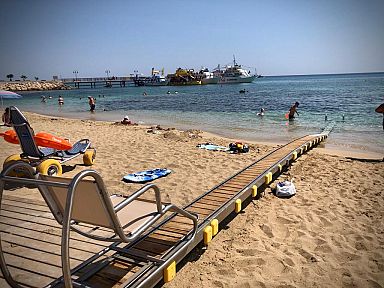Thanks to a European project, people with reduced mobility in Cyprus and in Greece can enjoy the sea as many beaches are now equipped with wheelchair ramps, devices to get them into the water and much more.
The beauty of Cypriot beaches is well known, but what is less common knowledge is how they are increasingly accessible for people with reduced mobility.
Avros Shiathas is paraplegic. Four years ago, he had an accident at work and he has needed a wheelchair ever since. He is one of the many people who now use the Paralimni beaches' access for people with reduced mobility. He finds these beaches adapted to his needs using an app on his phone.
Thanks to the European project ERMIS II, five beaches in Cyprus and two in Syros in Greece now have ramps, rest areas and remote-controlled wheelchairs on rails to help people get directly into the water unassisted.
The beaches that have this access in Greece are Vari and Voulgari, in Cyprus they are Agia Triada, Kalamies, Vyzakia, Vrysoudia and Vrysi 2.
The chairs to help lower people into the water are called SEATRAC. They are powered by solar panels and they are off the grid.
Ignatios Fotious is the CEO of Tobea, the company that makes SEATRAC. He says that using solar panels to power them is the ideal solution "because it's green and so there's no impact on the environment", but also because they don't want the chairs to stop if there's a loss of power from the grid. They don't want to leave anyone stranded.
These chairs are made of stainless steel to resist the marine environment. The SEATRAC itself can be assembled and dismantled in a few hours, so they're practical to install. This equipment is also used by the elderly, pregnant women and other people who need safer, practical ways to get into the sea.
For Avros, the things put in place on these beaches are very practical. "You need the paths because it's not easy to roll in the sand. You can't roll in the sand with a wheelchair", he adds. He explains that without these things you can't get to the sea without other people's help and "some people don't like to get help from others". For him, this access makes people with reduced mobility "feel free and independent again."
One of the project's challenges was to convince the local authorities of the importance of investing in such facilities. George Economou is in charge of the beaches in Paralimni. He says these access points have boosted tourism in the area. People are not only coming from Cyprus but from abroad as well to visit them.
The total budget of ERMIS II was 584 858 euros, over 84% of which was provided by the European Union's Cohesion Policy. As well as access ramps and relaxation areas, the project offers 24 free for use wheelchairs for the sand and seven SEATRAC chairs. On average 15 people with reduced mobility use these facilities every day.












